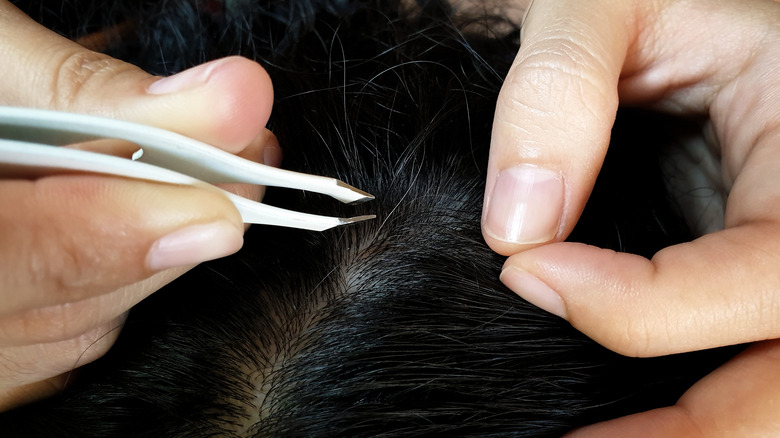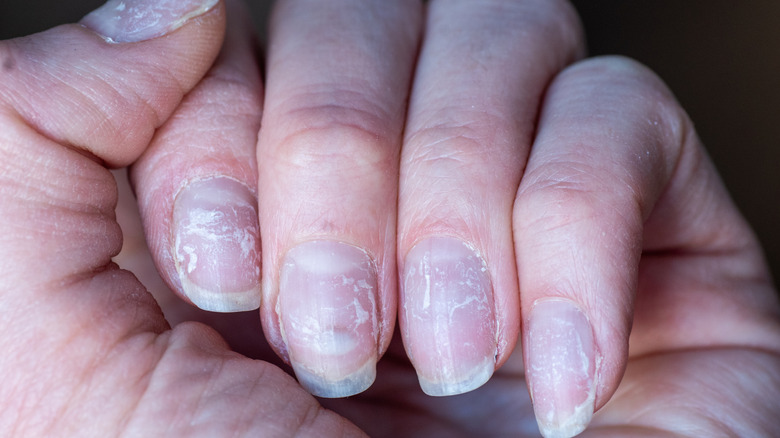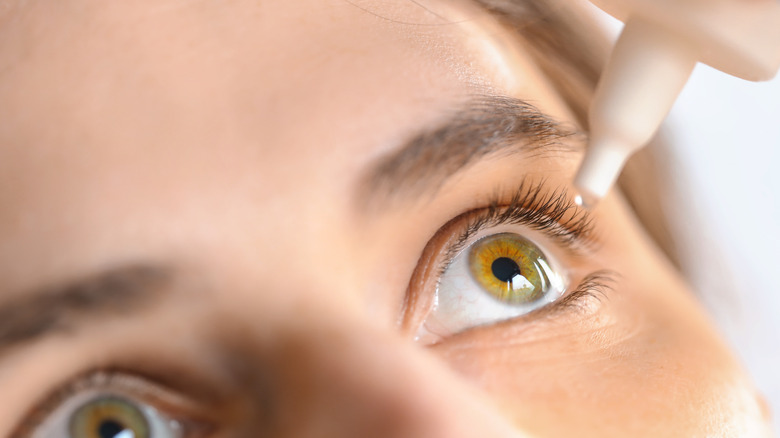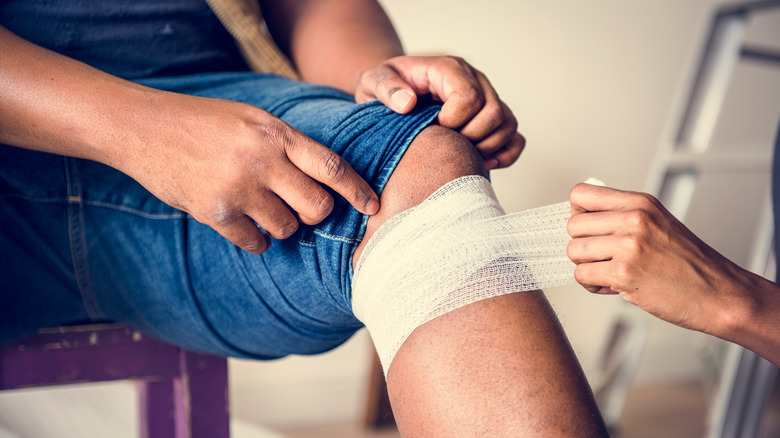10 Signs You Need More Collagen In Your System
Collagen is one of those things that you probably hear about fairly regularly — even though you may not be totally sure what it is. To put it simply, collagen is an essential protein that helps make up our muscles, tendons, bone, and skin. It is responsible for around one-third of the protein that your body needs, according to WebMD, and your system produces it naturally. And there's more than one type of collagen. In fact, there are 16 different kinds.
Although this protein is necessary for living a healthy life, it naturally depletes with age. As a result, some turn to collagen supplements. While research is still being conducted to determine how effective supplements are when it comes to bones and muscles, there are some significant data that say they are good for skin and joints (via Healthline).
Before you run out to your local health store to get a bottle of collagen, learn the clear indications that you're actually in need of a boost.
Decreased skin elasticity
When you look into the mirror in the morning and notice some fine lines and wrinkles, don't be hard on yourself. Aging is natural! Some health experts even say that signs of aging can happen as early as age 25 (via Verywell Health). And while sun damage, smoking, and even repeating the same facial expressions can affect your skin, one of the main reasons for aging skin is a lack of collagen, which can result in less elasticity.
This means you can get wrinkles from something as simple as sleep creases that occur as a result of how you sleep. Additionally, the less elasticity your skin has, the easier it is for your eyelids and eyebrows to droop (via WebMD). A lack of collagen can even cause rings or drooping around your neck (via The New York Times).
Again, none of this is abnormal. Still, if you happen to notice skin that is less firm (or that it's thinner or feels rougher), it could very well be that you need more collagen in your body, according to Verywell Health.
Premature graying
Collagen can help your hair thrive. This makes sense given the fact that collagen is an important protein and your hair is made up of mostly protein (keratin, to be exact). In fact, collagen contains some of the amino acids used to produce keratin. Also, the antioxidants in collagen can help to protect your hair follicles from free radical damage. And, since collagen makes up approximately 70% of the middle layer of your scalp that holds your hair follicles, collagen can help to prevent hair thinning too (via Healthline).
Since collagen helps to keep free radicals at bay, it can also keep them from damaging the melanin that your hair follicles produce. This is a good thing because the longer your hair's melanin is able to remain intact, the longer it will take for your hair to turn gray. If you've been noticing more than a few white or silver-looking strands as of late, it could just be from a lack of collagen (via RealSimple).
Dry and brittle nails
Your nails can tell you a lot about the state of your health, according to WebMD. If they are pale, you might be anemic or low in nutrients; if your nails are white with darker rims, your liver could be having some issues. Or, if your nails are yellow, the first thing you should consider is you might have a fungal infection — although it could also point to having a thyroid problem or diabetes. If your nails are pitted, psoriasis or arthritis could be the cause. But what does it mean if your nails look dry and brittle?
There are a number of underlying reasons why nails may appear this way, like thyroid problems (via WebMD). However, a drop in collagen could also be to blame. When you don't have as much collagen in your body as necessary, it can cause your nails to feel and look dry and brittle. But there's good news. A 2017 study published in the Journal of Cosmetic Dermatology found that collagen supplements can "[alleviate] the symptoms of brittle nails and improves nail growth rate."
Cataracts
If you were to ask someone with cataracts what it's like, they might tell you that it's similar to looking through a foggy window. As a result, it can be difficult for people with this eye disorder to drive at night, read under "normal" lighting, handle bright light, and maintain a steady eye prescription over time (via Mayo Clinic).
While a routine eye exam can help your eye doctor to catch any signs of cataracts as soon as possible, avoiding smoking, eating a healthy diet, wearing sunglasses when you're outdoors, and reducing your alcohol intake can all help to prevent cataracts from becoming a personal health concern. Something else that can assist you is collagen. Collagen is vital for eye health, as it makes up "80% of the ocular structure," according to Total Eye Care. Interestingly, boosting your Vitamin C intake can also help your eyes, as this vitamin is what helps your body to make more collagen (via Healthline).
Joint pain
One type of collagen that your body produces is located in your joints and intervertebral discs. It helps to cushion and protect both of them by creating cartilage. And while it shouldn't be overlooked that some of the leading causes of joint discomfort include different kinds of arthritis, gout, tendinitis, viral infections, and injuries, there is a significant amount of data to support that low levels of collagen can lead to joint pain.
The reality is that as you age and there is less collagen in your body, your chances of being diagnosed with a degenerative joint health issue increases — that's the bad news. The good news is adding more collagen into your system can reduce the amount of discomfort that you may feel. It can also lower bodily inflammation, decrease joint stiffness and offer your body better joint support overall (via Healthline).
Oh, and if you're having joint pain because you are an athlete, you should know that some studies show that collagen supplements can assist with overall joint discomfort, including knee joint pain.
Gastrointestinal problems
A whopping 60 to 70 million Americans are affected by some sort of digestive-related health issue, according to the National Institute of Diabetes and Digestive and Kidney Diseases. Some are fighting infection and thus experience digestive issues. For others, certain medications are to blame. And then there are medical conditions, including irritable bowel syndrome (IBS), colitis, and Crohn's disease (via WebMD). You may not think collagen could play a role in digestive health, but it can, according to the Cleveland Clinic. In fact, the clinic cites that low collagen can indeed lead to "gastrointestinal problems due to thinning of the lining in your digestive tract."
Adding more fiber to your diet, drinking more water, and properly managing your stress levels are all things that you can do to help to heal and even prevent digestive issues. Just remember to add some collagen into the mix. It will benefit your digestive system too.
Weight gain
Have you been noticing that, lately, you've been packing on a few extra pounds and you're not exactly sure why that is the case? Healthline shared that causes include consuming too much sugar, an imbalance of hormones, water retention, and a side effect of medication. And while you might've heard rumors that too much collagen can actually lead to weight gain, it's actually the opposite that is true. For instance, if you are gaining weight because of your diet, taking collagen supplements may "indirectly" lead to weight loss, per Healthline, as it may reduce fat accumulation and encourages muscle mass.
It's also worth noting that since cellulite can damage the bands of collagen in your body, a collagen supplement can help to repair the damage that's been done while boosting your metabolism (via Medical News Today). So, if you want to lose weight, it's possible increasing your collagen intake could help you to do just that.
Vaginal dryness and thinning
Now here's something that you may not have known. While you're probably aware that menopause is the season of a woman's life when she goes 12 full months without a cycle and that it typically starts somewhere between 45 and 55, were you aware of the fact that the full transition can take anywhere from seven to 14 years?
During that time, it's pretty common for your hormones to fluctuate — especially when it comes to your estrogen levels. "Decreases in estrogen lead to decreased blood supply to the vagina and vulva, less collagen in the vulvar tissue, and changes in vaginal pH, to name a few," Candice Vaden, women's health nurse practitioner, told Healthline. As such, you may notice dryness and vaginal thinning.
While consuming foods that are high in estrogen (like flaxseeds), taking vitamins that can boost your estrogen production (like vitamins B and D), and even considering herbal supplements (such as black cohosh and evening primrose oil) can all help in this area, according to Healthline, being intentional about getting more collagen into your system is a wise move because it will help to support the production of more estrogen in your vaginal area.
Slow wound healing
Although collagen is well-known for keeping skin looking youthful, it's also great for helping with the healing process of wounds. WebMD explained that it's this protein that can help to stop the bleeding of a wound, cultivate the production of new blood vessels, and support your immunity and skin cells when it comes to the overall healing process.
Furthermore, WebMD highlighted a study in which a group of people who took a collagen supplement three times a day for two months noticed that their wounds were actually able to heal twice as fast. This is a good reason to increase your collagen intake as you age, as it naturally takes longer for wounds to heal as we get older.
Difficulty sleeping
While growing up, you may have heard that you need no less than eight hours of sleep a night if you want to remain in great health. That's actually a pretty good estimate because, according to the Mayo Clinic, if you get anything less than seven hours on a consistent basis, it could lead to health issues like obesity, diabetes, depression, high blood pressure and even a stroke. This is why it's important to treat getting rest as a necessity rather than a luxury. And while there are all kinds of reasons why sleep deprivation could be an issue for you, it may surprise you to know that a low amount of collagen could be an underlying culprit.
This is because collagen contains glycine. In fact, Healthline explained that glycine is its main amino acid. And when you add more glycine into your system, it may actually bring your body to a comfortable temperature so that you're able to get higher-quality rest. Collagen can help you to sleep more soundly? Amazing. The more you know, right?










